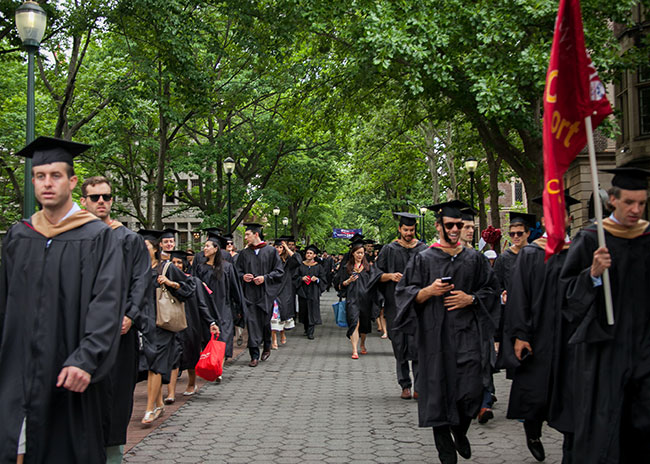By Erin Arvedlund
Philly.com
WWR Article Summary (tl;dr) Start-ups are growing in popularity among Wharton MBA’s. Both New York-based Custora and San Francisco-based Fundbox were both founded by Wharton MBAs where many 2016 Wharton grads now work. In addition, Jet.com was founded by a Wharton MBA candidate who did not finish the program.
Philly.com
About 10 percent of the Wharton School’s 2016 MBA grads went to work as entrepreneurs — either at businesses they founded themselves or other start-ups — compared with a fraction of Wharton MBAs a decade ago.
Recent alumni of the University of Pennsylvania school are working at such firms as Twitter, Uber, Jet.com, NerdWallet, Snapchat, Wealthfront, a robo-adviser competing with conventional Wall Street asset-management firms, and the Philadelphia-based, health-care-related Aledade.
Of the 850 students in Wharton’s 2016 graduating class — those who got their degrees between June 1, 2015, and May 31, 2016 — 50 are self-employed or are starting their own businesses, compared with 36 in the Class of 2015, according to the latest survey of MBA hiring and compensation provided by Wharton.
“What we’ve seen is that the number of students joining a start-up or starting a business — the group pursuing entrepreneurship — is about 10 percent of the class. It’s a significant number. Ten years ago, it might have been in the single digits,” said Michelle Hopping, director of employer services, MBA Career Management, at Wharton.
Median base salary for Wharton grads? A solid six figures: $125,000 plus bonuses, the survey showed.
As part of its recent Stellar Startups series, the Inquirer highlighted several Wharton MBA and undergraduate students who have started their own businesses, including Sujay Kumar’s Lilu, Pam Forster’s Forerunner Group, and Rajat Bhageria’s ThirdEye Glass.
How does Wharton funnel some newly minted MBA graduates to start-ups and vice versa? It sends them to Silicon Valley, Hopping said. Every fall, a cohort of about 70 second-year MBAs spends the semester on Wharton’s campus in San Francisco.
“They apply and demonstrate an interest in digital marketing, venture capital or innovation, or they want to be on the West Coast and meet start-ups,” she said. “That’s been a huge driver for us to build relationships, and we also bring companies and alums to speak in the classroom there.”
In addition, Wharton showcases alumni in different stages of their careers, especially those who have graduated in the last five years, Hopping said.
“It helps the students project in the short term. More seasoned or senior alums also come in to speak about the current state of sectors such as digital health,” she said.
Wharton also conducts Career Treks, in which MBA candidates visit different cities and about a half-dozen companies in a day for meet-and-greets and informal question-and-answer sessions.
Last year, Hopping said, Wharton did a fin-tech Career Trek in New York City and visited several companies, including one called Canary, a security business. Its recruiter came in to talk about internships, and one Wharton grad ended up interning there.
At a recruiting event Monday, Hopping said, a 2012 Wharton alum spoke about why he turned down several offers upon graduation and instead moved out to Silicon Valley. He ultimately joined Twitter and has been promoted, she said.
“While that’s not a start-up anymore, he held out for the right thing,” she said.
Start-ups where 2016 Wharton grads are working include Custora, Fundbox, HelloFresh, and Soludos. Both New York-based Custora and San Francisco-based Fundbox were founded by Wharton MBAs. Jet.com was founded by a Wharton MBA candidate who did not finish the program.
“We’ve really seen the trend toward entrepreneurship grow in the past five years,” Hopping added. Wharton MBAs who succeed at start-ups have to go in adding value immediately, she said, and can’t expect a Corporate America structure.
“They have to demonstrate value without training or on-boarding.
buy furosemide generic buy furosemide online no prescription
It’s an approach that’s much more about execution than strategy or grand ideas.”
The Wharton MBAs are a sign of the times, local venture capitalists say.
“Our goal is to raise an army of entrepreneurs locally,” said Wayne Kimmel, the Philadelphia-based founder of SeventySix Capital and a venture capitalist who has seeded start-ups such as the IndieGogo crowdfunding platform, Seamless Web, and Philadelphia-based WhistleSports network, which competes with ESPN. His venture-capital firm has invested in about 175 start-up companies and is raising money for a third fund.
“It’s really a golden age of entrepreneurship, largely due to shows like Shark Tank,” Kimmel said. “They have really mainstreamed the idea of start-ups, valuation, and elevator pitches.”














































































































































































































































































































































































